Last Updated on November 16, 2023
Stress, cortisol, and weight gain go hand in hand.
I find that most people already know that stress isn’t good for them. But they don’t know how much damage it really does or how it causes weight gain and other pesky symptoms and major health issues.
That’s why I’m doing a deep dive into the harmful impacts of stress, cortisol spikes, and how cortisol causes weight gain and health issues.
- Do you struggle with stress and feel overwhelmed often?
- Do you feel like it’s easier to gain weight than lose it and have stubborn fat?
- Do you eat to cope with stress?
- Do you constantly crave food?
- Do you struggle to get motivated because you’re burned out?
If so, this is for you! I’m going to explain how cortisol affects your weight, health, and mindset – then I’m going to share easy tips and resources to start reducing cortisol in your body ASAP.
After you’re done taking a look, leave me a comment and let me know if this post helped you.
It’s virtually impossible to get fit and healthy when you are struggling with high cortisol levels and stress, which is why I felt compelled to make this video and share my top cortisol-reducing tips with you.
I could give you a meal plan and workouts that would work… but if you’re too stressed you’re not going to get results as quickly as you could compared to someone else who isn’t stressed out.
My clients who are laid back and positive lose weight easier and faster compared to my clients who are stressed out but eating and exercising perfectly. My positive happy clients don’t eat and exercise consistently either but they still get better results. Why? Cortisol and stress make it difficult to burn fat because they cause the metabolism to dysfunction. Metabolic dysfunction programs the body for weight gain.
Every single person I know is dealing with stress and it’s impossible to eliminate stress completely from your life! It’s also impossible to look and feel your best when you’re stressed.

I mentioned this when I shared exercises that help get rid of lower belly fat. But it’s very difficult to get results from workouts and your meal plan when you’re stressed. And low belly / belly fat / chronic bloat are all HUGE signs that you have too much cortisol.
That’s why I’m explaining how stress affects your weight, health, and mood in a negative way and sharing quick and easy tips to reduce stress that work quickly.
Cortisol and Weight Gain
Stress releases cortisol aka the ‘stress’ hormone. A little cortisol is a good thing but it’s also not good if you’re trying to lose your excess, unwanted body fat.
- Cortisol is a catabolic hormone. Catabolic hormones ‘break’ down. In this case, cortisol breaks down protein which is what your muscles are made of. When muscle breaks down, metabolism slows down, too which can make you gain weight and make fat more difficult to lose.
- Cortisol also changes body fat distribution and can cause stubborn belly and back fat. Different metabolic types store fat in different places, too. Some more in the hips and thighs, others in the belly, others in the upper body. Eating for your Metabolic Type can help reduce stress… because eating things that aren’t right for your body’s unique needs causes stress.
- Stress triggers the release of cortisol, a hormone associated with increased appetite and the storage of visceral fat. That’s because when cortisol is released is also raises blood sugar, which can cause cravings and hunger.
- Cortisol also increases blood sugar. This in turn increases cravings for foods high in sugar and fat, which are often less nutritious and lead to nutrient deficiency, low immunity, and weight gain.
- Stress can cause sugar (and carb cravings), making it harder to stick to a meal plan. That’s why I include an eBook with 10+ tips to stop a craving in seconds in all of my meal plan/nutrition programs.
- Too much cortisol can be inflammatory, which can make you gain weight, too.
Because stress affects nutrient absorption, it can cause metabolic dysfunction, which affects health and mood even more.
To see if you’re experiencing signs of metabolic dysfunction and learn more, take my free metabolic analysis and training.
Stress and Health
Not only does cortisol affect your weight. It also causes major health issues that can cause weight gain, too.
Here’s a list of ways stress affects health in ways that can also contribute to weight gain:
- Stress can make it harder to absorb nutrients, increases nutrient requirements, and increases the rate of nutrient elimination… so you won’t get the same results from a diet if you’re stressed.
- Because stress affects nutrient absorption, it can start to cause nutrient imbalances and deficiencies that cause metabolic dysfunction. This in turn slows metabolism and reduces immunity, leaving you vulnerable to weight gain, illness, and disease.
- Stress can interfere with sleep quality and duration. Poor sleep is linked to weight gain and obesity due to disruptions in hunger-regulating and fat storing hormones.
- Too much stress and cortisol over time can burn out the adrenals and cause cortisol production issues. When you’re no longer able to produce cortisol significant health and weight issues and diseases are very common.
Physical Symptoms of Too Much Cortisol
If you have any of these symptoms you need to reduce stress in your body ASAP!
HOW TO REDUCE CORTISOL & STRESS
SLEEP TO REDUCE CORTISOL
Sleep is the best way to metabolize and eliminate stress hormones. If you’re already feeling exhausted and fatigued eliminate extracurricular activities that drain you.
Tips to ensure better sleep:
- Use blue light-blocking glasses after dark – Blue light from screens can affect sleep and cause insomnia – I recommend (and have) these Blue Light Blocking Glasses
- Use Melatonin – a little goes a long way! Pistachios are also high in melatonin! Pop a small handful 3 hours before bed to help you relax. I like this brand of Melatonin because it also contains Kava. It’s also from a reputable, pure, potent, regulated brand.
- Avoid eating & exercise within 3 hours of
- Avoid Alcohol – Although ‘relaxing’ alcohol makes it harder to get the regenerative sleep you need to truly reduce stress.
- For even more tips, check out this post with 12 tips for better sleep.
OXYTOCIN BREATHING REDUCES STRESS & CORTISOL IN SECONDS
Oxytocin breathing releases oxytocin, which is the ‘love hormone’. Oxytocin calms the stress response and combats cortisol in the body. This technique is best when you’re stuck in a situation where you can’t leave. For example when you’re at work, on a plane, or stuck at an event that’s stressing you out.
- To oxytocin breath: Inhale for 8 counts, hold for 8, and exhale for 8 counts.
- Repeat until you feel relaxed like you just had an orgasm.
- I do this 200 times a day : )
AVOID EATING WHEN YOU’RE STRESSED
Eating when you’re stressed can start to negatively affect your hunger hormones, namely ghrelin and leptin. Cortisol also raises blood sugar and insulin levels. So when you eat when you’re not hungry and stressed instead, you cause imbalances in your hunger hormones and also spike blood sugar and insulin even higher. This can cause you to feel hungry/not hungry, it can also cause diabetes.
Drink lemon water instead! It’ll help you self-soothe, helps regulate hormones, and has Vitamin C that helps counteract the damaging effects of stress.
EXERCISES THAT REDUCE CORTISOL & STRESS
Avoid doing overly intense workouts! When you’re stressed and exercising aggressively it can increase the fight or flight stress response and increase inflammation.
The good news is, when you’re stressed you’ve released some cortisol and it’s best to exercise to tell your body you’re ok!
- Do light, low-impact cardio. Walking or the elliptical are perfect cardio options! Avoid doing more than 30 minutes of cardio.
- Try one of my workout programs. All of my workouts are designed to help balance hormones and reduce stress – to make you feel a lot better – not worse!
- Always avoid high-impact, high-intensity, long-duration workouts as they cause stress in the body.
- Do somatic exercises. Somatic exercises help regulate the nervous system, reduce cortisol, and get the body in a calm, relaxed state. If you experience stress regularly, you need somatic exercises!
SUPPLEMENTS TO REDUCE CORTISOL
Click Here to see my recommendations for supplements that help manage stress so you can reduce cortisol. If you’re not sure what you need, book a Supplement Consultation with me here.
I hope this post helped you! What did you think about it?
Let me know in the comments.
xo
Your Coach and Biggest Cheerleader
![]()
Pin this post to Pinterest so you’ll have it forever.
Sources:
https://www.ncbi.nlm.nih.gov/pmc/articles/PMC5455070/
https://www.ncbi.nlm.nih.gov/pmc/articles/PMC5734726/
https://www.ncbi.nlm.nih.gov/pmc/articles/PMC5373497/
https://www.ncbi.nlm.nih.gov/pmc/articles/PMC5324577/
https://www.ncbi.nlm.nih.gov/pmc/articles/PMC4413428/

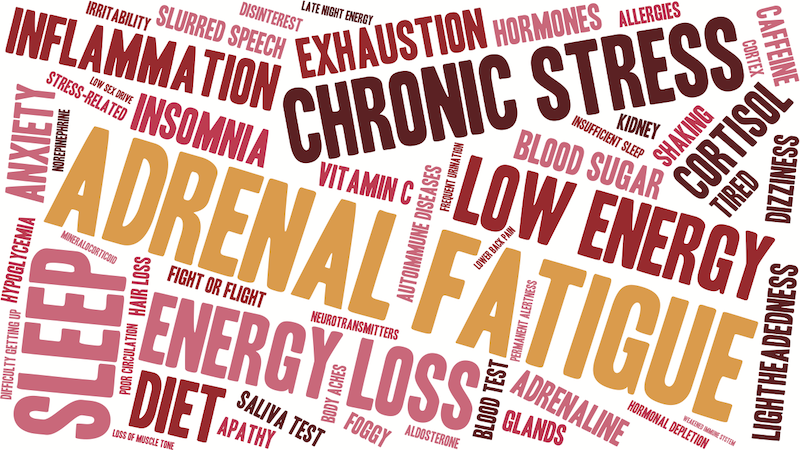

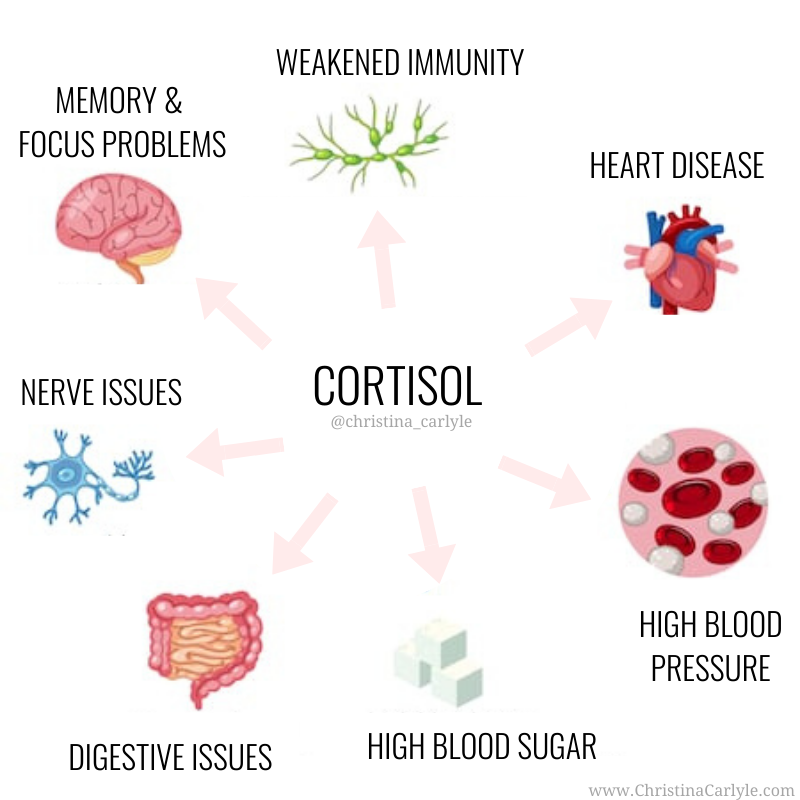
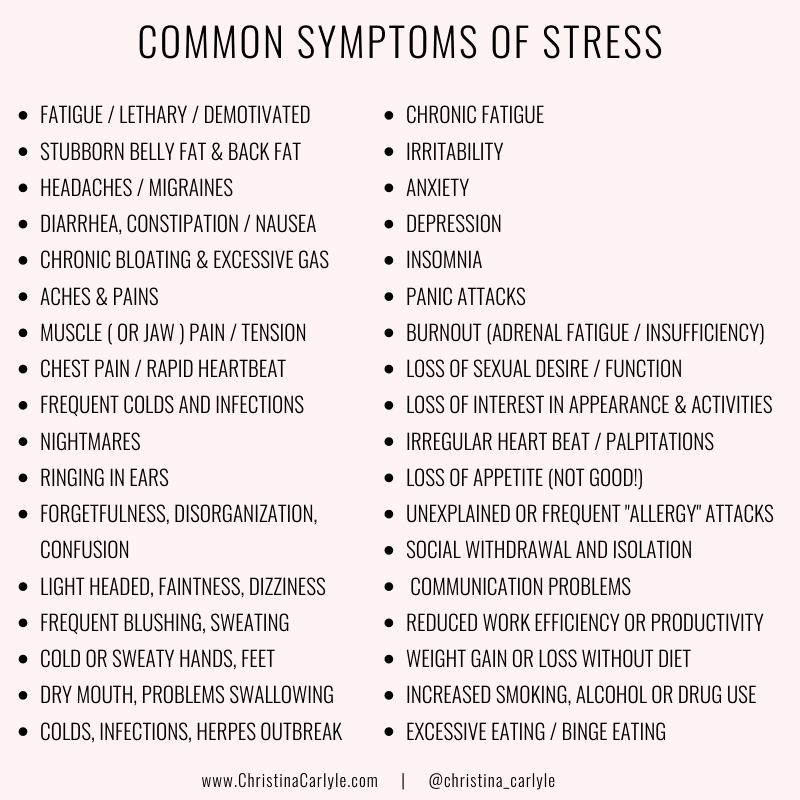




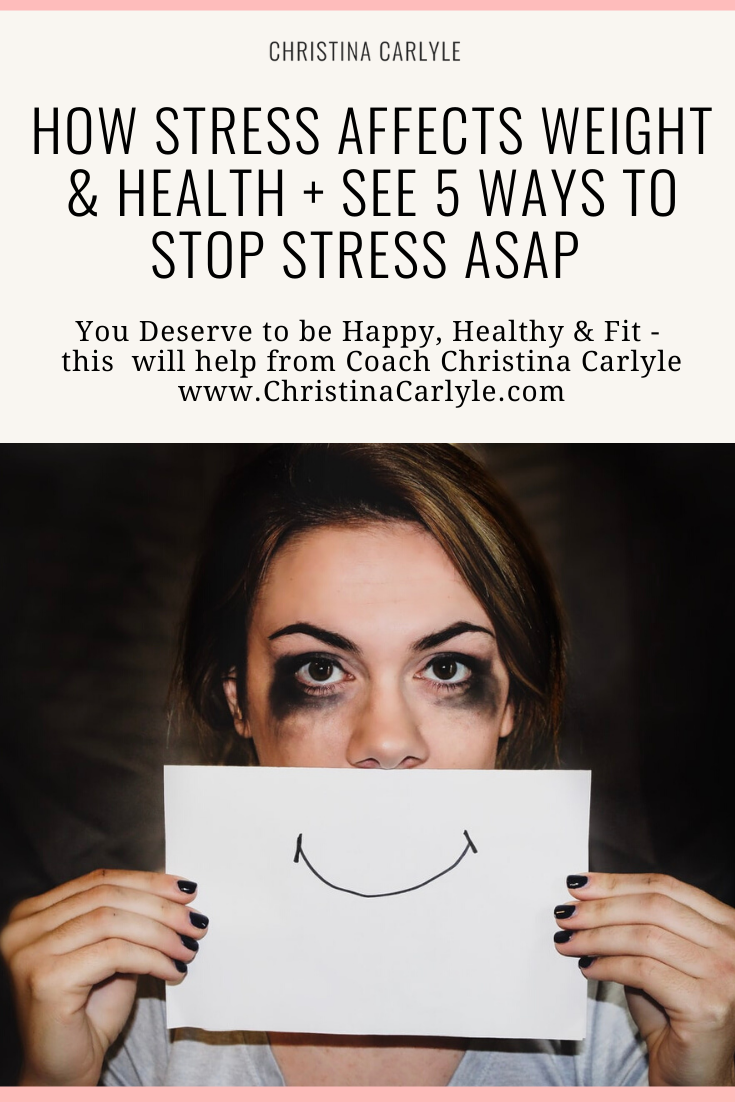



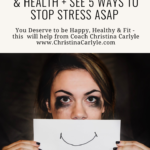
You are so awesome! Such an inspiration and a fantastic motivator! Thank you so much for these great tips!
Awww thank you so much, Michelle. I’m so happy to hear you feel that way. You just made my day! xxoo
This article is fantastic! Can’t wait to put these tips into action. Thank you SO much!,
Thank you Sylvia <3 You're very welcome xo
I found your website about a month ago and have done the reset and am now on the TT, and this blog is just what i needed!! I’m a very anxious and stressed out person, so I’m going to try all of this and hopefully see an improvement. I have loved all of your resources, videos, and tips especially in the VIP section! The Reset totally changed the way I look at food and the toxins effecting me, I love how straight forward you are, you keep it real!
Thank you so much Shelbi!! Your comment just made my day. 🙂
Very useful article! Keep up the good work
Thank you! I’m glad you found it helpful 🙂
Thank you so much. I learned about oxytocin breathing. My Apple Watch was actually prompting me to breath 50 times a day at work so I turned it off because it was irritating. After reading this, I am going to turn it back on because now I understand it’s science backed.